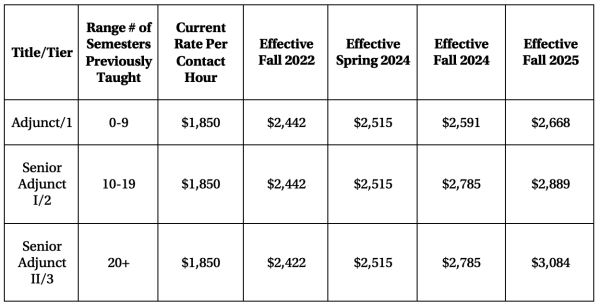As of Jan. 30, the members of United Council of Academics at NJIT (UCAN) ratified a new contract. The two separate agreements — one for adjunct faculty and another for graduate students — include new provisions regarding salary structures, grievance procedures, doctoral funding, and more. This contract follows a long struggle between the union and NJIT administration towards renewing an expired contract, both in duration and content.
“It used to be the case that graduate students were paid for the nine months of the school year, on some stipend, and then for the summer, they were paid $3,000. How do you survive on $3,000 over the summer? You can’t,” asserted third-year applied mathematics Ph.D. candidate and graduate executive member-at-large Nicholas Harty.
The union was also able to establish a grievance procedure, which will streamline any future concerns that may arise regarding the newly ratified contract. Funding for students pursuing a doctoral degree has also been increased from four years to six years; “the average time to completion [of a Ph.D.] is five and a half [years],” clarified Harty.
The contract specifies that the stipend for a given academic year has increased from previous academic year’s $29,823.08 to $31,094.80 currently. Additionally, $4,664.00 have been allotted to the summer stipend for graduate students for the present academic year.
Graduate contract negotiations were intense. Harty recalled, “We were sitting in the room with management, passing proposals back and forth; they had a room, we had a room. We would call them in, show them what we had. They would go back, mark it up, and then give it back to us. That’s when I would say bargaining really started.” The discussions took place over winter break in Fenster Hall.
In the case of adjunct faculty, adjunct salaries were increased by 30% — professors are paid per credit. The salary for all adjuncts has been increased to $2,515.00 per credit starting in Spring 2024. However, this raise doesn’t fully compensate adjunct professors in comparison to their neighbors at Rutgers-Newark.
“They teach similar courses, [have a] similar skill set, and they get paid more at Rutgers, and at NJIT, they are paid lower,” explained Prakash Kothari, adjunct executive member-at-large and an adjunct professor in the Industrial and Mechanical Engineering department.
Regardless, the new contracts also guaranteed $40,000 in funding for professional development for adjunct employees, which includes compensation for travel and accommodations to vocationally relevant conferences or trainings. There remains progress to be made, however, regarding healthcare benefits. “Going from university to university to university, they [adjunct professors] were not covered [in terms of healthcare] and many other adjuncts have a full-time job and they are covered by other employers.” said Kothari.
The NJIT administration also seems satisfied with the negotiated terms of this new contract. An official statement from Matthew Golden, Vice President for Communications and Marketing, confirmed, “NJIT is very pleased to have reached agreements with its labor partners that have since been ratified. The people of NJIT are its greatest resource, and the entire university benefits from these agreements being reached through a collaborative bargaining process.”
In the meantime, members of UCAN hope to keep membership active and focus on finding ways of providing for the faculty of NJIT. Although not every requested provision was granted in the new contract, a win is still a win.
The newly ratified contract will expire June 30, 2026. These contracts are public record and can be read in their entirety at the following link: https://hr.njit.edu/union-contracts.
Read more about initial attempts at negotiations here: https://njitvector.com/17118/news/talks-between-ucan-and-njit-shift-after-initial-contract-request-surpasses-one-year-of-negotiations/.
































